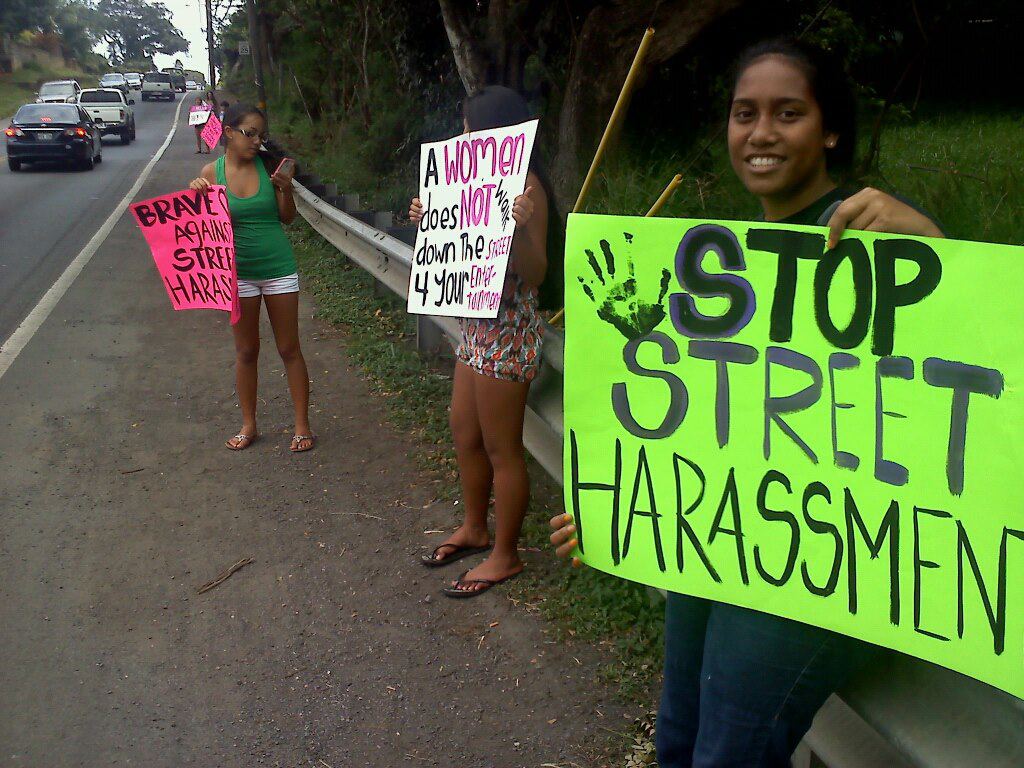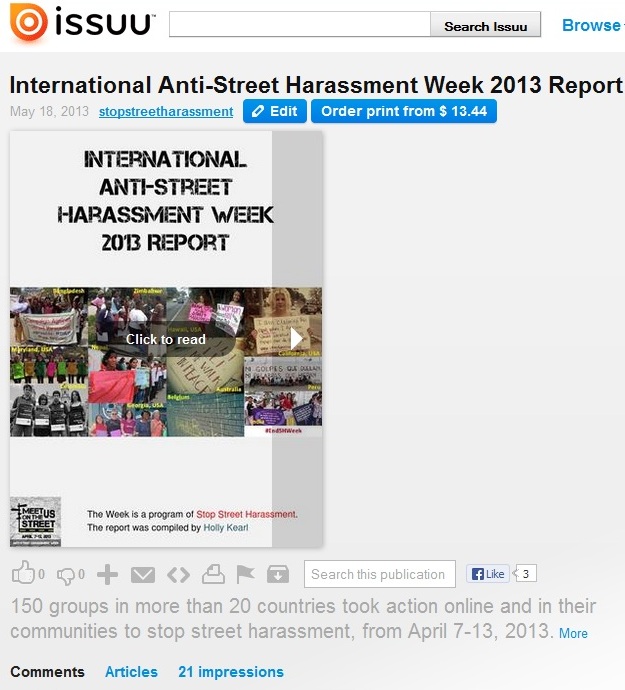During International Anti-Street Harassment Week, Hollaback! Polska conducted a survey about street harassment in Poland. They put together videos featuring some of the responses. It’s available in Polish and English.
#EndSHWeek 2013 Report of Activities!
Check out the report detailing the activities that took place during International Anti-Street Harassment Week 2013 in April! Thank you to everyone who spoke out and participated that week. You’re amazing!
Australia: The Power of Collective Story-Telling

This is (belatedly) cross-posted with permission from Hollaback! Melbourne’s blog.
Last week Hollaback! Melbourne launched a series of initiatives as part of our celebration of International Anti -Street Harassment Week.
To the right is the photo wall – comprised of anti-street harassment messages from Melbournians. The messages are powerful. Get a closer look at the photo gallery here!
So why is it important that we engage in collective storytelling? The Hollaback! model of crowd sourcing anonymous stories of harassment, your posting to a photo wall, people participating in a Chalk Walk where messages are written on the pavement and left for others to see – what is the point of all that?
In the past when I have been harassed the experience has been an isolating one. And even though the harassment made me angry/uncomfortable/disgusted/upset I just accepted that these things happened, and that it was just going to be an occasional horrific intrusion in my day to day activities.
The message that harassment was normal was sent early – when I was a young teen men started to honk at me as I walked down the street, and a friend of mine told me that it meant I was hot and it was a compliment. Whoah, feelings of discomfort INVALIDATED.
The feelings I’ve described are part of the normalisation of street harassment – where you’re told or sent the message that it is ok, or alternatively that street harassment might not be ideal but just IS. And therefore you come to accept it (even while hating it!).
So when you engage in collective storytelling, when you engage as part of a city-wide movement like Hollaback! Melbourne, when you engage worldwide and take to the streets to protest street harassment in the same 48 hour period as others around the world you are helping create a new framework for people to think about their past experiences.
You’re helping others to problematize their everyday experiences (as well as all those things being cathartic!). People power is the only way we can end street harassment!
I’ll leave you all with some images form the Chalk Walk last Saturday on Sydney Road – by all accounts it was a wonderful experience. Passersby engaging, people stopping and chalking, and some seriously rad messages. Gallery of all images to come! Happy Friday everyone!





Video: Meet Us on the Sidewalk
Temple University student Kara Lieff made an awesome video about the sidewalk chalking that happened in Philadelphia for International Anti-Street Harassment Week by groups like Poppyn, GALS, FAAN Mail, Philly Youth Poetry Movement, Philadelphia Futures, and Hollaback! Philly.
Meet Us on the Sidewalk from Kara Lieff on Vimeo.
After #EndSHWeek, What Do We Do Now?

By: Talia Weisberg, SSH Correspondent
Earlier this month, women and men across the globe commemorated International Anti-Street Harassment Week. Whether it was through tweetchats, webinars, self-defense classes, sidewalk chalking, leaflet campaigns, or numerous other activities, Anti-Street Harassment Week marked the raising of the world’s consciousness against street harassment, an insidious form of sexism that is too often ignored by society.
Now that Anti-Street Harassment Week is over, those of us who understand the negative implications of street harassment and want to eradicate it for good face a dilemma: what do we do now? What can and should we do to keep up awareness and fight against this social phenomenon during the rest of the year?
I believe that it is imperative not to lose the momentum that we gained during Anti-Street Harassment Week. We can’t just throw out our leftover leaflets and stop going to those self-defense classes we signed up for. Everything we did and all the gains we made will have all been for nothing if we let activism fall to the wayside and ignore the pressing need for eliminating street harassment.
We also have to continue to schedule events like sidewalk chalkings and Take Back the Nights. Although it’s certainly easier to encourage attendance and participation during a week dedicated to awareness of street harassment, it’s imperative that we organize them anyway. After all, street harassment happens every day, and its victims are just as horrified by it during Anti-Street Harassment Week as during the rest of the year.
Another thing that we, as activists, must do is to talk about street harassment and share our stories about it. The most effective way to raise awareness on any issue is to speak with our best friends and grandfathers and third cousins and hairdressers and people we see once in a while in the dog park about it. That way, we spread knowledge of this issue as far and wide as we can. Many people who have experienced street harassment don’t even know that it has a name, and are therefore incapable of recognizing the extent of how problematic it is. Once we’ve raised the consciousness of those who have suffered at the hands of street harassment, we’ve got ourselves a veritable army of women and men who want to make the streets a safe place for every individual.
I truly cannot wait until this day arrives.
Talia Weisberg is a Harvard-bound feminist hoping to concentrate in Studies of Women, Gender, and Sexuality. Her work has appeared in over 40 publications and she runs the blog Star of Davida blog (starofdavida.blogspot.com).

